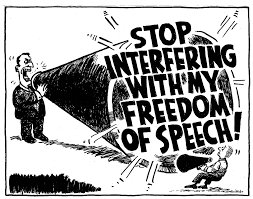
by Marianne Skånland
Speech at the demonstration outside the Norwegian parliament on 16 April 2016.
The speech was held in English.
Freedom of speech is important and positive.
This is an opinion shared by most of us.
Why?
It cannot be because it’s always nice to hear people’s honest opinion.
It isn’t nice, because it is so often critical.
So again: Why do we think it is important?
Well, let us hear what the European Court of Human Rights has to say about freedom of expression (‘expression’ comprises both speech and writing):
In a judgment from 1976, the Court says clearly that free expression is one of –
«…. the principles characterising a ‘democratic society’. Freedom of expression constitutes one of the essential foundations of such a society, one of the basic conditions for its progress and for the development of every man.»
So freedom of expression is important because it is necessary.
It is necessary for people in a democratic society to speak clearly about how things are, if they are going to be able to change them.
It is necessary in order to bring out in the open everything which is wrong and harmful in our society, so that it can be put right.
It is necessary in order to stop abuse and tyranny and exploitation of people. As long as only the abusers, the tyrants and the exploiters know about it, and their victims are not given protection if they speak out, it will all continue.
Barnevernet, and the Norwegian state, do not like this.
They do their utmost to stop people from speaking and writing about the way Barnevernet tears apart their family, and the way they themselves are struggling to be reunited and left in peace by Barnevernet.
Parents who speak out, are punished by being cut off even further from their children. Our authorities say that this is not punishment, and that it is done to protect the children.
Shall we believe that children are protected by not hearing that their parents love them and are doing their utmost to get them home?
But our courts, too, our judges and the lawyers engaged by the municipalities to go against the families – they believe this nonsense, and they use it as an argument to stop the children from going home, stop their parents from getting them home.
Norway is in a bad way.
Human rights are individual rights, the rights of each unique person.
The major danger to a single person or a small flock is always the organisation called the state, because the state has power over us. This is necessary, because otherwise we would have anarchy, not democracy, (and anarchy is no viable alternative).
But anybody with power has to be watched, and be stopped if they abuse their power. And this is not possible without the right to bring it out into the open, by free speech.
Norway prides itself on being a democracy, and Norwegian politicians and other leaders travel around the world preaching human rights to others.
When it comes in the form of criticism against them, though, the Norwegian state does not like free speech any more. They try to make it impossible, even criminal, to show others how Barnevernet acts.
There are many many examples of this, including downright attempts to forbid people to put out on the internet videos of their own children and how a dozen Barnevern and police come into their homes and carry away the screaming, frightened kids. The mayor of a country district wants a ban on showing Barnevernet in action, because, she says, it hinders Barnevernet and the police in their work.
Some social work, which cannot be shown.
The Court of Human Rights also makes it clear, in several of its judgments, that not only do we have a right to speak, people also have a right to receive information.
Normally this strenghtens the right of the press to print and publish. But since our mainstream media have for decades not wanted to bring unsavoury truths about Barnevernet to people, I think people have the right to receive it from us! We who write on the internet and demonstrate in the streets, like we do here.
Let’s continue, then! Until we have seen the last of the present, fictitious protector of children and we get a real one established.
So our authorities do not want us to speak or listen about hard facts of Barnevernet. They even shun information themselves!
When people try to talk turkey about substantial facts, they say, «We cannot go into individual Barnevern cases.»
Can they not?
All this week there has been news about the Panama Papers, apparently indicating some economic skulduggery, and some managers of our big banks have said they didn’t know anything about who did what in Luxembourg or the Seychelles.
What happens then? Economic and legal experts turn up on tv and say: The boss cannot excuse himself for not knowing what his subordinates are doing. It is his responsibility to know!
So can the politicians and the administration in the municipalities, and those higher up in government, say, «We have delegated everything to Barnevernet and what they do is nothing to do with us. We have decided that we cannot look into it.» ?
No, they can not.
Our chief justice way back, Emil Stang Jr., once said (I think it was about 60-70 years ago) that unjustifiable laws cannot be maintained in the long run.
In the Barnevern sector, there is a whole lot of laws and rules waiting to be toppled! We must get it out the way the Court of Human Rights says: We must vigorously practice free speech, a basic condition for the progress of society and each one of us.
Thank you.